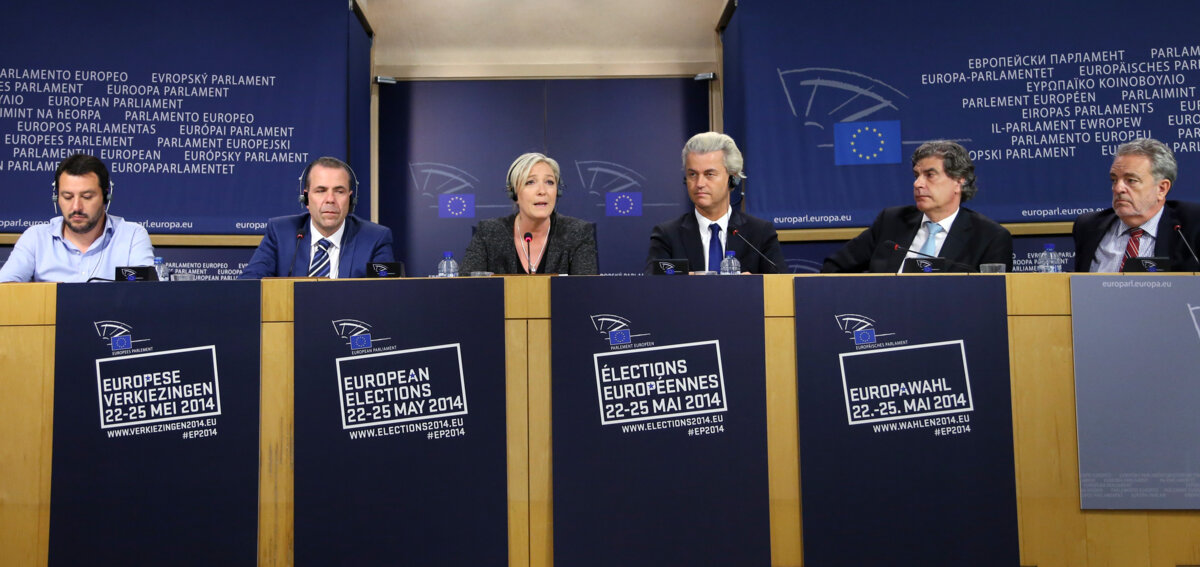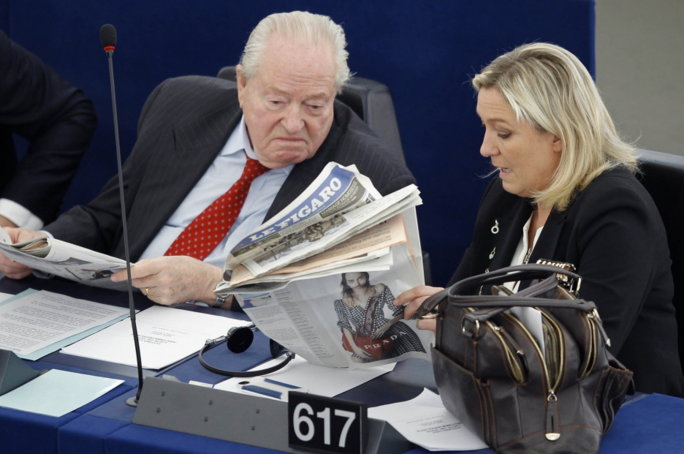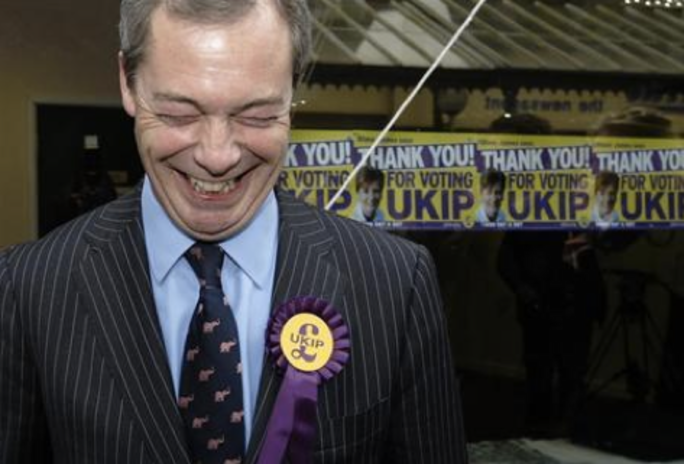Marine Le Pen has been busy in Brussels since the European elections last month which saw her far-right Front National (FN) pick up 24 seats. Last week she held a press conference in which she discussed plans to form her own political group in the European Parliament. Flanked by Geert Wilders from the Dutch Party for Freedom PVV and representatives from the Flemish nationalist party Vlaams Belang, the Austrian Freedom Party FPÖ and the Northern League party from Italy, the FN president looked forward to heading the only political force in Europe able, as she put it, to oppose the “[European] oligarchy which is afraid of the people”.
Yet while the French far-right leader sounded confident of forming a group by the deadline of June 24th, the reality is somewhat different. To create a distinct political grouping at the European Parliament the rules state that it must contain at least 25 MEPs drawn from parties in seven different member countries. With 24 members in its own right, the FN will have no problem fulfilling the first requirement. But the second criterion is a different matter. As of this week she still lacked two parties, though she insisted the plan was on track. “The possible combinations are considerable, we're not going to mention them in front of you...it requires discretion,” she told journalists.
Given the difficulties involved in bringing together a political group made up of seven different parties from seven different countries, the question arises: why is Marine Le Pen so keen to make it work? In the last European Parliament the FN's three MEPs – of whom she was one – were what is known as 'non-attached members', meaning they were not aligned with any political group. Given the FN's stridently anti-European tone, and its years of attacks on and mocking of EU institutions, this at least seemed a logical stance for the party's members. So why, suddenly, does Marine Le Pen want to play along with the European Parliament's game of political groups?

Enlargement : Illustration 1

Officially, the FN's president has a purely political objective; that of strengthening the party's influence inside the European Parliament and its ability to oppose any measures it claims will hurt France. For though the number of MEPs from Le Pen's party has grown spectacularly from just three to 24, the balance of power is still against the FN in a parliament of 751 Euro MPs. Even if she succeeds in creating a political bloc of around 40 MEPs, this will still only be the sixth or seventh largest group, far behind the conservatives (estimated at 214 seats), the socialists (191) and also the liberals, greens, the European United Left or even the eurosceptic European Conservatives and Reformists (ECR) to which the British Conservative Party belongs.
Yet despite its small size, an FN-inspired group would find it easier to table amendments on proposed legislation or even write reports. The group's president would also have a say at the weekly meeting of group presidents that fixes the parliament’s agenda. And a member of the group would also preside over at least one of the parliament's 22 committees, strategic positions which will be shared out under the Hondt proportional representation system in early July. Non-attached members are not able to head these important committees.
- The financial benefits for a parliamentary group
But these political aims are not the only benefits of forming a parliamentary group. If Marine Le Pen seems so determined to create one, it is because it would also bring considerable financial benefits. For each parliamentary bloc is entitled to its own funding from the parliament.
Each year a fixed sum is set aside to be distributed among the groups to help them function. In 2013, for example, seven groups shared a total of 57 million euros. In 2014 the budget is set at 59.8 million euros, with up to eight groups set to share the money. The amount each group receives depends, of course, on the number of MEPs it contains, but also on the number of languages spoken within the group. A group based around the FN's 24 MEPs could expect to get several million euros in grants a year.
Officially this money is to cover “administrative and operating costs” - secretaries, political advisors etc - plus also “expenditure used for political activities and information linked to [European] Union current affairs”. This means the money can be used to organise debates and lectures and to produce leaflets, including the cost of translation. However, this money cannot be used to finance political campaigns either at a European or national level.
The setting up of a parliamentary group also automatically triggers greater parliamentary funding of the pan-European political party which corresponds to it. Marine Le Pen is currently vice-president of the European Alliance for Freedom (EAF) party, which was founded by Briton Godfrey Bloom, who was a member of the United Kingdom's UKIP party before being forced to become an independent in 2013. If Le Pen succeeds in setting up a political group, the EAF, which received 385,000 euros in grants in 2013, should see this figure rise in 2014 and 2015.
Even if Marine Le Pen does not manage to set up a political group, her electoral success on May 25th will still guarantee considerable financial rewards for her party. Its 24 MEPs will each get 10,500 euros a month – 6,200 euros of this is net salary, with 4,299 being paid as general expenses – plus each will also have access to a maximum of 21,000 euros a month to pay assistants. This means in total the FN's allocation will fund at least 80 people's salaries over the five years of the new parliament.
The FN's European Parliament gravy train
- The funding of Le Pen's inner circle
The chief beneficiary of all this funding will be the Euro MPs themselves, who are largely members of Marine Le Pen's inner circle, including party leaders, established party figures and people close to them. Le Pen has sent a large part of her leadership team into the European Parliament, including the party's three vice-presidents, Louis Aliot, Florian Philippot and Jean-François Jalkh, its secretary general Steeve Briois and his deputy Nicolas Bay, plus Le Pen's father Jean-Marie Le Pen – the FN's honorary president. Two key advisors, Aymeric Chauprade and Bernard Monot, and Dominique Martin who has been electoral campaign director for both Marine and Jean-Marie Le Pen, are now also MEPs. Meanwhile veteran party figures who are heading for Brussels include academic Bruno Gollnisch, Mireille d'Ornano, Marie-Christine Boutonnet and Joëlle Mélin.
Other members include Dominique Bilde, the mother of Marine Le Pen's close advisor Bruno Bilde, and Mylène Troszczynski, the daughter-in-law of Michel Guiniot, a senior FN party official. The party's legal assistant Nathalie Betegnies, who was fourth on the election list in the greater Paris region, did not get elected, but Sylvie Goddyn, a member of the party's central committee who was described in the campaign as a “European parliamentary assistant”, did succeed.

Enlargement : Illustration 2

Marine Le Pen arranged it with the FN's ruling committee that she herself oversaw the composition of the electoral lists. To ensure certain loyal followers were rewarded, Le Pen readily dispensed with equality; two female MEPs who were elected last month were almost immediately obliged to step down, each making way for male candidates. Nor did she pay much heed to the new law on politicians not being able to hold more than one office at the same time; when the law comes into force in 2017 Steeve Briois, who was elected mayor of Hénin-Beaumont in March and then as an MEP in May, will have to choose between the two positions. And Le Pen was also happy to 'parachute' senior party figures into regions with which they have little connection; for example, Édouard Ferrand, a regional councillor from Burgundy in east France, was elected as an MEP in the South-West region, while Jean-Luc Schaffhauser, a local council candidate in Strasbourg in north-east France, became an MEP in the Île-de-France, the Paris region.
To these 24 MEPs, one can add the many parliamentary assistants – either based locally or at the parliament – who can be hired with the 21,000 euros monthly staff allowance each member gets. As Mediapart has already shown, the FN are past masters at making maximum use of money from Brussels, which in the last parliament enabled it to pay, in part, several party officials.
In this way Marine Le Pen was able as an MEP to employ two party vice-presidents – her partner Louis Aliot and Florian Philippot – who, during the 2012 elections, were both her presidential campaign directors and the party's spokesmen for the parliamentary elections. As for her father and fellow MEP Jean-Marie Le Pen, he hired as his 'local' assistants his personal secretary at the family home in Paris Micheline Bruna – who was also last year a 'local' assistant to another FN MEP Bruno Gollnisch - his personal assistant Gérald Gérin, the FN's vice-president Jean-François Jalkh and Julien Sanchez, the new mayor of Beaucaire, south-west France, who was in the party's press office until his election. A large number of these people close to the Le Pens can also be found holding positions in the family's micro political parties – small-scale political structures sometimes used, quite legally, to get round the limits on how much individuals can donate to a party - either as secretary general or as treasurer, as Mediapart has revealed here and here.
Since 2009 the European Parliament’s rules have stopped MEPs from hiring family members as parliamentary assistants. This meant that neither of the Le Pens could employ Marine's sister Yann Maréchal, who is in charge of the FN's large political gatherings. She was, though, taken on as a 'local' parliamentary assistant by Bruno Gollnisch.
Such practices have helped ease the Front National's long-standing financial problems. By 2010, following its failures in the 2007 parliamentary elections – which resulted in its official French state funding going down from 4.5 million euros to 1.8 million euros - and after a costly dispute with its printer – which was demanding the repayment of the 7 million euros it had lent the party – the FN had accumulated huge debts of 10 million euros. The Le Pen micro-parties called Cotelec and Jeanne and the sale of the party's old headquarters – known as the 'Paquebot' - at Saint-Cloud in Paris in 2011 allowed the party to keep its head above water until the parliamentary elections of 2012, after which its financial situation improved.
- The precarious balancing act with the Le Pen parliamentary group
So, will Marine Le Pen manage to form a parliamentary group and hit the Euro jackpot, one which could help her bid to become French president in 2017? The head of the FN has found herself in competition for willing partners with the UK's UKIP party whose leader, Nigel Farage, has ruled out any suggestion of working with the FN on the grounds that it is “anti-Semitic”. UKIP is staying with the Europe of Freedom and Democracy group. So far Le Pen is assured of the support of four parties, the Dutch PVV, Belgium's Vlaams Belang, the Austrian FPÖ and the Northern League party from Italy, which together with the FN consist of 38 seats. But they still lack two parties.

Moreover, Marine Le Pen does not have many options left, between the parties, such as UKIP and the Danish far right, that refuse to deal with the FN, and those far-right parties which the FN itself refuses to do a deal with, such as Golden Dawn from Greece, Hungary's Jobbik and the Bulgarian ultra-nationalist party Attack.
Though they are politically quite close to the FN, the Swedish Democrats have been hesitating about joining Le Pen's group. The announcement of a European coalition between its own youth organisation and their counterparts in the FN, Vlaams Belang and the FPÖ has caused turmoil in the Swedish party. An official said there is a “strong chance” that they will join with UKIP, who like the FN also have 24 seats. At last week's press conference Marine Le Pen sought to keep the issue open by declaring: “The Swedish Democrats have not for the moment indicated their desire to join Farage's group.”
The FN insists that it is looking at countries from “central and eastern Europe” without specifying which ones. Marine Le Pen could look towards the europhobe party from Poland, the KNP, which has four MEPs, or choose to ally herself with Lithuania's Order and Justice party, led by Rolandas Paksas. Even if this means being careful not to become entangled in the affairs of this former Lithuanian president who was impeached in 2004 for political corruption. Yet Marine Le Pen's pro-Russian stance might be a problem for two parties who are quite hostile to Moscow.
The Front National president also knows that the balance of such a group is a precarious one, where each new addition could cause one of the existing supporters to quit. For example, the arrival of the Lithuanians in the group would make it difficult for the Poles to join, for historical reasons. Meanwhile a seasoned parliamentary observer notes: “Anything that's too extreme could drive out Wilders' PVV.”
Even supposing Marine Le Pen does manage to form such a group, the question arises: will it hold together for five years? According to an analysis of voting in the last European Parliament carried out by the non-governmental organisation Votewatch, the parties set to make up that group have not always seen eye to eye on key issues. “Eurosceptic MEPs from the extreme right voted the same way in 50% of cases,” it says. Indeed, the PVV and FN, who differ on economic matters, have voted opposite ways 49% of the time.
The Front National is also haunted by the spectre of the disastrous and short-lived group called Identity, Tradition, Sovereignty (ITS), which was created in January 2007 and headed by Bruno Gollnisch. The group fell apart when five members of the Greater Romania Party walked out following comments by fellow group member Alessandra Mussolini that all Romanians were “criminals”. Their departure left ITS without enough members to constitute a group and it was dissolved in November 2007. At the time news of its dissolution was greeted with a round of applause during a full session of the parliament in Strasbourg.
-------------------------------------------------------------
The French version of this story can be found here.
English version by Michael Streeter


